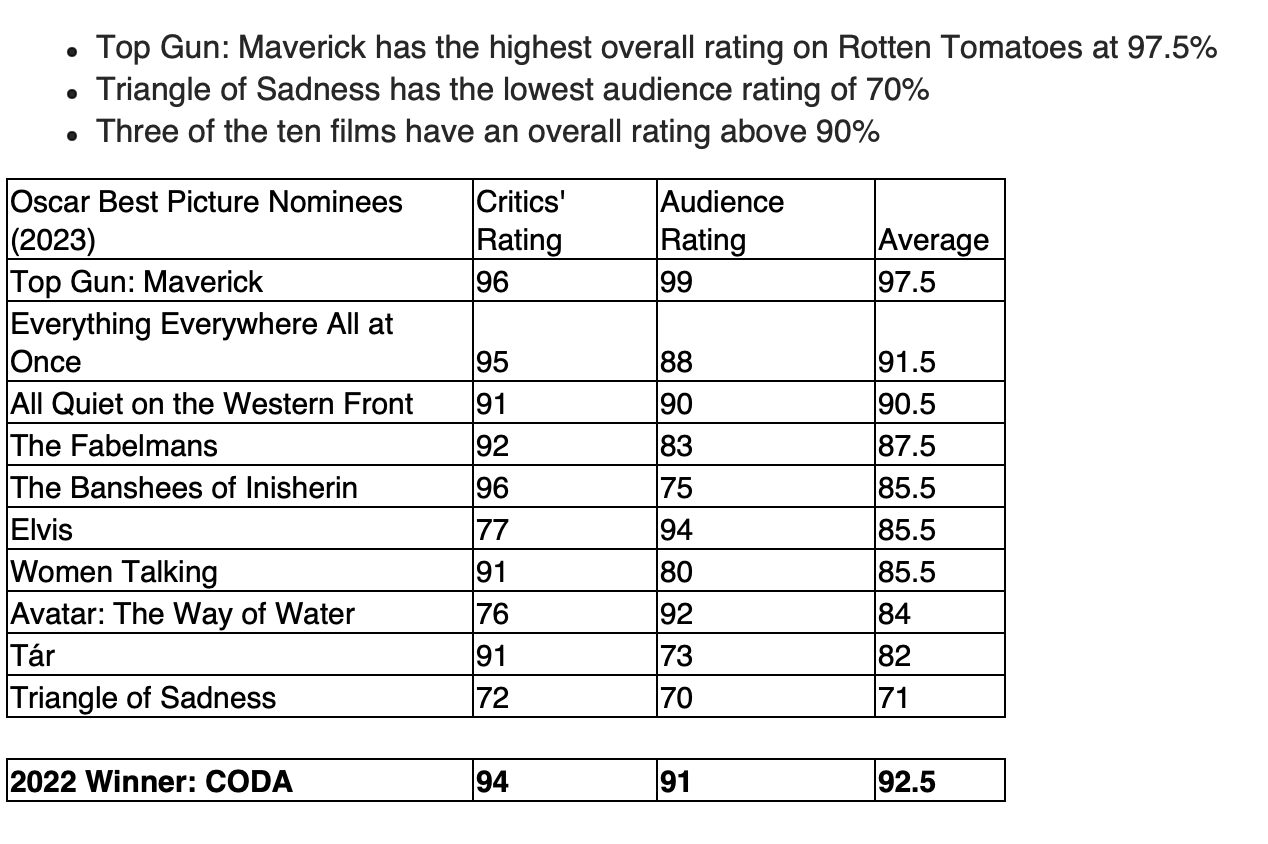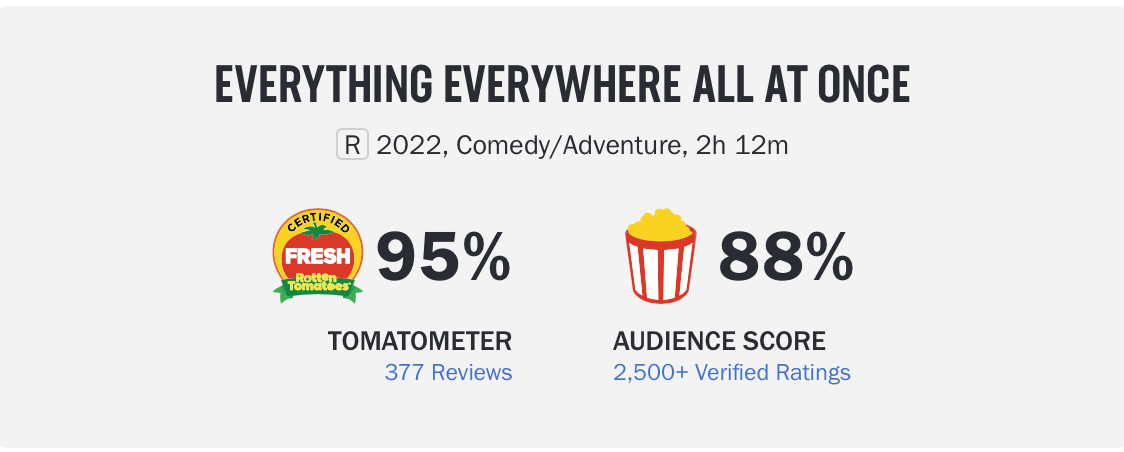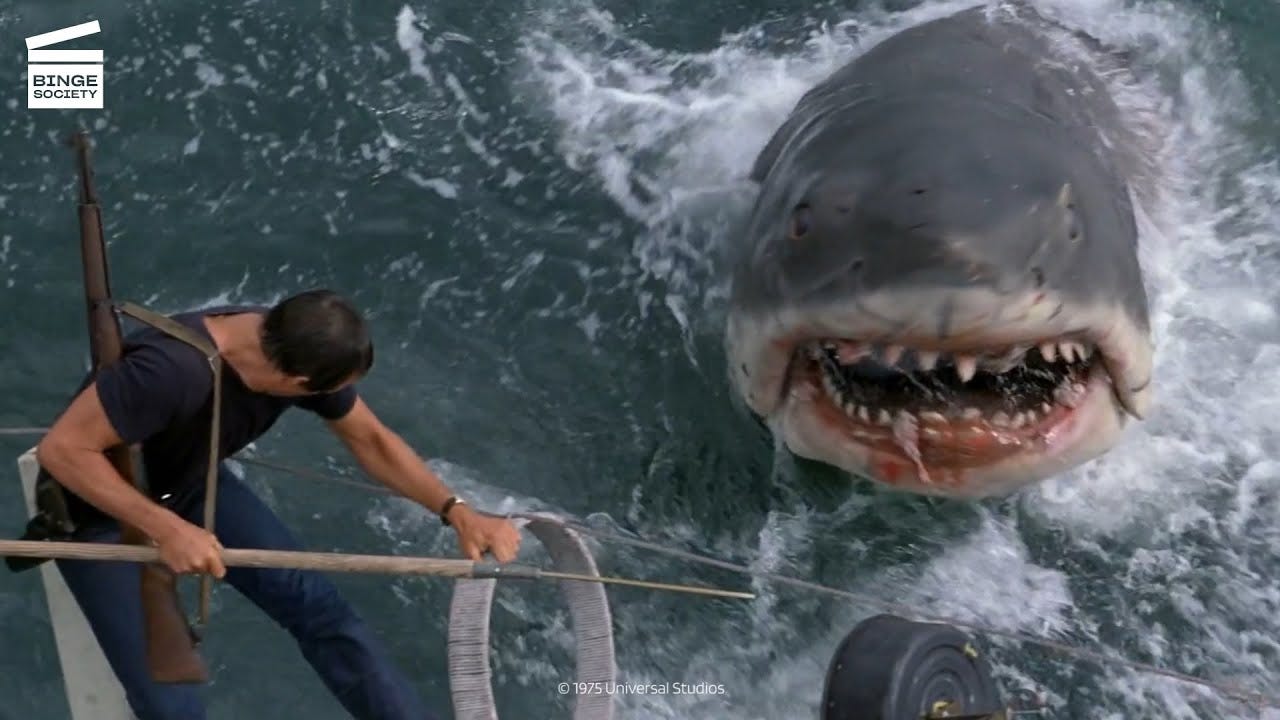“The end is inevitable, Maverick. Your kind is headed for extinction.”
”Maybe so, sir. But not today.”
How is it possible that the highest-grossing, best-reviewed film of the year - by critics and audiences - that was credited with saving the film industry amid near-total collapse would not be winning Best Picture at the Oscars on Sunday, March 12th?
There is no question that Top Gun Maverick should be winning. In the real world that is what would happen. It deserves it more than any movie ever has in the 22 years I’ve been covering the Oscars. But will it win? Of course not.
The movie that will likely win instead is Everything, Everywhere All At Once, an original, imaginative film about an elderly Chinese mother (Michelle Yeoh) who must save the world by popping in and out of the multiverse so that she can eventually accept and love her gay daughter (Stephanie Hsu), flaws and all, and appreciate her long-suffering husband (Ke Huy Quan).
Some love it, some hate it, but there is no question why it has swept the season so far and is likely to win a whole bunch of Oscars on Sunday, including Best Picture.
There isn’t a film that reflects the “woke” Left more than this one. This kind of winner makes the industry feel safe. They can hide who they really are — mostly white, mostly male — by shrinking back into the shadows, centering people of color, and voting for films that reflect the ideology of the utopians.
For several years now, the Oscars have been in an ongoing tug-of-war over merit and equity. It started with the rise of marginalized voices on social media calling out the Oscars for not giving enough of their wins to women and marginalized groups.
This led to big changes by the Academy to bring in new members and diversify its roster. Every year activists would count the heads to see whether certain criteria had been met.
When Trump won it caused mass panic that led to a kind of ongoing hysteria that targeted filmmakers via social media. La La Land was “racist” so Moonlight won. Three Billboards Outside Ebbing, Missouri was “racist” so The Shape of Water won. Then came Green Book, where the hysteria peaked.
The already declining ratings got even worse as Hollywood took a side against Trump. They just assumed all of their viewers and ticket buyers agreed with them and if they didn’t they were expendable.
As Oscar ratings declined, the tug-of-war between merit and equity continued heating up, largely due to political polarization. At some point, everything Hollywood put out seemed to be in some way political. As a climate of fear gripped Hollywood it began to infect everything from late-night comedy to screenwriting to award shows.
And so “Woke Hollywood” was born.
It would only get worse by 2020, after the Great Awokening in the Summer. By now, equity has easily beaten merit and the public was starting to notice. They couldn’t stand being lectured to by Hollywood elites, especially at awards shows.
By the time COVID hit, it wasn’t just empty theaters threatening to end Hollywood as we once knew it. It was also the newfound zealotry that had captured the entire industry. Prestige movies that came out in 2021 bombed. By 2022, we were all getting nervous. The Oscars were dying on the vine. Their brand seemed to be toxic. Politics, Wokeism, and activism had choked the life out of the film industry and the Oscars.
And then came Top Gun Maverick. The only thing people knew about it was that it was good and it wasn’t “woke.”
There he was, the last movie star, Tom Cruise, doing what we’ve always needed them to do: be great. Be larger than life. But it was more than that. Dripping with testosterone and alpha male energy, Cruise peacocked through the movie in a way that has been mostly absent in movies as studios tried to force women into those roles to re-order the hierarchy and hack our sensibilities.
But there was nothing they could do about it. Top Gun Maverick took off like an F-15.
Even Steven Spielberg noticed that Top Gun Maverick saved Hollywood.
Watched by millions in their prime, the Oscars used to celebrate one of the greatest things ever invented by this country: movies. The more people those movies attracted, the better they were rewarded for it by the Oscars. The Oscars mattered to the people because the people mattered to the Oscars.
What is a step in the right direction for the Academy was that they have, for the first time in a while, included some blockbusters and money makers in their lineup. But there is no getting around that blazing number for Top Gun Maverick at a time when it was a struggle to get people out of their homes to see movies at all:
Top Gun Maverick - $718 million
Avatar The Way of Water - $670 million
Elvis - $150 million
Everything, Everywhere All At Once - $70 million
The Fabelmans - $22 million (A Steven Spielberg movie)
The Banshees of Inisherin - $10 million
TAR - $7 million
Women Talking - $5 million
Triangle of Sadness - $5 million
All Quiet on the Western Front - Netflix N/A
When you add the box office to this:
Top Gun Maverick’s audience rating is astonishing. Most films don’t get anywhere near that number.
Here are some sample audience reviews:
Meanwhile, the movie that will win, Everything Everywhere All At Once has an audience score of 88%, which is still good, but it ain’t 99%.
Here are some sample user reviews:
Maybe because the script changed many hands, or that the idea kicked around for 30 years, or that they never had any expectations of trying to please the insider cliques of film criticism or Film Twitter - whatever it was they have made a perfect film. There isn’t a single wasted moment. Within the first five minutes you’re completely invested in Maverick hitting Mach 10:
That feeling you get while watching Top Gun Maverick is a familiar, distant tug at something you can’t quite name. That feeling is what Hollywood used to give audiences: what they actually wanted instead of what Hollywood thinks they should want:
Explained here by Louis CK:
And Russell Brand explains the unifying quality of the movie to bring so many of us together under one roof and share in one experience that binds us to one another in ways we haven’t felt for a very long time:
The best thing about this movie is that it doesn’t try to fix society, or shame the non-compliant, or even name an enemy. It has one job, to entertain us for a couple of hours, make us feel good and send us back into the world all the better for it. A Quentin Tarantino explains:
When I first started my Oscars website, a business I’ve been running for 22 years, I often used the phrase, “too big to ignore,” which meant a film became a cultural phenomenon and a box office success such that the Oscar voters would be forced to reward it for that.
That was true of Jim Cameron’s 1997 smash hit, Titanic. They didn’t want to give him Best Picture and Best Director but they had to. It defied expectations and became the highest-grossing film of all time. It was too big to ignore.
Now, though, there is no such thing “too big to ignore” at the Oscars. They have been rewarding films that made no money but awarded the first woman, or first Black-directed film, or first film made by a woman of color, or the first film with a predominantly deaf cast. They’ve been chasing that high since Green Book won.
Box office should matter. It is a much stronger measure of a film’s ultimate success. The industry and the Oscars have become an aristocracy of a kind that seems to believe telling stories that resonate inside their Royal Court have any meaning beyond those castle walls. They don’t.
Their primary mission seems to be to drive propaganda to audiences, the kind of thing that so many Conservatives feared back in the 1940s and 50s about Communism. Now it’s not only happening but it’s almost mandated.
They continually tinker with their utopian diorama in an effort to make it more perfect, more equitable, more pure. The Spirit Awards have made their acting categories “gender neutral.”
The British Film and Television Academy was so plagued by accusations of racism they mostly eliminated the privilege of their own members nominating in the acting and directing categories, opting instead for a committee to hand-pick equitable choices.
The Golden Globes were canceled after being accused of racism in a mass hysteria event on par with Salem in 1692. They are slowly scrabbling their way back after changing up their memberships and their rules.
And the Oscars have an “inclusivity mandate” set to take effect in 2024. The already “wokest of woke” industry that is currently experiencing a kind of “no white men for any jobs ever” has in place official policy to be inclusive in front of and behind the camera for a film to even qualify for the Oscars.
Every speech is either a sermon or a plea for absolution. Every win is a way to say “see, we fixed the problem.” Everyone is supposed to applaud along like they don’t know everyone is voting for people of color so that they don’t look like racists. Is that fair to the winners? What kind of an honor is that if their main purpose is to shield voters from attacks and make them look good?
This Fish, Swallow You Whole
Some of you might know that there is a Netflix short about my seeing Jaws at ten years old called the Summer of the Shark.
In it, I talk about why that movie resonated with me and with so many others in 1975. Like Top Gun, Jaws was a movie we didn’t even know we wanted but gave us exactly what we needed.
The 70s were depressing for almost everyone, but more than that, we’d lost touch with what it felt like to be a winner. Movies back then were great, but they were dark and aimless. Films like The Godfather, the Graduate, and others depicted the central male hero in a state of moral and intellectual paralysis.
What we wanted, what we needed was a leader. We got our first taste of it with Chief Brody doing what no one else in the town or on the Orca could do. The old fisherman couldn’t bring down the mighty beast, nor could the bespectacled scientist. It was then up to the big city cop who was afraid of the water to take his one-in-a-million shot.
The explosion at the end of Jaws was unlike anything any of us ever saw. It gave us deep satisfaction to see what was not a real shark at all but a supernatural evil impossible to destroy.
Jaws turned out to be a foreshadowing of the 1980 election. It wouldn’t be that surprising that five years later America would abandon the Left almost completely and vote for Ronald Reagan whose strong leadership was something everyone, by then, craved.
But Jaws didn’t win Best Picture either. One Flew Over the Cuckoo’s Nest won instead, the ultimate movie about a lost man. Could the embrace of Top Gun Maverick be a foreshadowing of our future as we all begin to seek the strong leadership we’ve been missing?
Who’s to say. But we do know that this is the movie of the year by any measure and beyond any doubt. If they don’t give it their top prize, which they won’t, then it’s their loss.
It isn’t even something that has to be explained. Just sit down anyone in front of it and they won’t be able to resist being carried away by the storytelling, the romance, the action sequences, the score, and the humanity.
We had no idea how much we were missing movies like this. Good stories, well told.
We need to believe as Americans that we can achieve impossible things. Movies can’t fix us but they can entertain us and in so doing, make our lives a little bit better. No other country can make movies like Jaws and Top Gun Maverick.
In ten years most people won’t remember the films that were nominated for Best Picture. They barely even know what has won in the past ten years. Hell, even 20. They’ll look back on this year and wonder how it all could have gone so wrong that a movie people loved that much was not named Best Picture of the Year.
Maybe that question takes us to the inevitable answer - that once the ship hits the iceberg, it’s all over but the shouting.



















Share this post